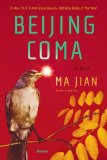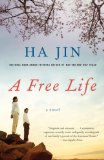Summary | Excerpt | Reviews | Beyond the book | Read-Alikes | Genres & Themes | Author Bio

A True Story of Love and Conflict in Modern China
by Diane Wei LiangBeijing University, 1986. The Communists were in power, but the Harvard of China was a hotbed of intellectual and cultural activity, with political debates and "English Corners" where students eagerly practiced the language among themselves. It was there that Wei met Dong Yi, beside the Lake with No Name.
Beijing University, 1986. The Communists were in power, but the Harvard of China was a hotbed of intellectual and cultural activity, with political debates and "English Corners" where students eagerly practiced the language among themselves. Nineteen-year-old Wei had known the oppressive days of the Cultural Revolution, having grown up with her parents in a work camp in a remote region of China. Now, as a student, she was allowed to immerse herself in study and spend her free hours writing poetry - that bastion of bourgeois intellectualism - beside the Lake with No Name at the center of campus. It was there that Wei met Dong Yi.
Although Wei's love was first subsumed by the deep friendship that developed between them, it smoldered into a passionate longing. Ties to other lovers from their pasts stood always between them as the years passed and Wei moved through her studies, from undergraduate to graduate. Yet her relationship with Dong Yi continued to deepen as each season gave way to the next.
Amid the would-be lovers' private drama, the winds in China were changing, and the specter of government repression loomed once again. By the spring of 1989, everything had changed: student demands for freedom and transparency met with ominous official warnings of the repercussions they would face. The tide of student action for democracy - led by young men and women around the university, including Dong Yi - inexorably pushed the rigid wall of opposition, culminating in the international trauma at Tiananmen Square.
On June 4, 1989, tanks rolled into the square and blood flowed on the ancient city streets. It was a day that would see the end of lives, dreams - and a tortuous romance between two idealistic spirits. Lake with No Name is Diane Wei Liang's remembrance of this time, of her own role in the democratic movement and of the friends and lovers who stood beside her and made history on that terrible day.
Poetic reflection defines this moving memoir that deftly weaves the personal and political into a shining braid. Diane Wei Liang has written a lament for her homeland, one that teems with regret for what could have been...continued
Full Review
(1085 words)
This review is available to non-members for a limited time. For full access,
become a member today.
(Reviewed by Marnie Colton).
 At one point in Lake with No Name, Diane Wei Liang recounts her harrowing childhood experience bringing cabbage in from the frost, a yearly event that all the children at the collective had to participate in to demonstrate their strength and patriotism. Liang describes becoming ill with fever after carrying damp, cold cabbages for hours, and then listening to the radio announcers praise the heroic efforts of the peasantry in preserving the winter crop. As miserable as this task was in reality, it would have made the ideal subject for a Chinese propaganda poster, the state-sponsored artwork that dominated the Chinese cultural landscape until the late 20th century.
At one point in Lake with No Name, Diane Wei Liang recounts her harrowing childhood experience bringing cabbage in from the frost, a yearly event that all the children at the collective had to participate in to demonstrate their strength and patriotism. Liang describes becoming ill with fever after carrying damp, cold cabbages for hours, and then listening to the radio announcers praise the heroic efforts of the peasantry in preserving the winter crop. As miserable as this task was in reality, it would have made the ideal subject for a Chinese propaganda poster, the state-sponsored artwork that dominated the Chinese cultural landscape until the late 20th century.
From the late 1940s through the 1980s, the Chinese Communist Party ...
This "beyond the book" feature is available to non-members for a limited time. Join today for full access.

If you liked Lake with No Name, try these:

by Ma Jian
Published 2009
At once a powerful allegory of a rising China, racked by contradictions, and a seminal examination of the Tiananmen Square protests, Beijing Coma is Ma Jian’s masterpiece. Spiked with dark wit, poetic beauty, and deep rage, this extraordinary novel confirms his place as one of the world’s most significant living writers.

by Ha Jin
Published 2009
A moving, realistic, but always hopeful narrative novel of the Wu family - father Nan, mother Pingping, and son Taotao - as they fully sever their ties with China in the aftermath of the 1989 Tiananmen Square massacre and begin a new, free life in the United States.
To limit the press is to insult a nation; to prohibit reading of certain books is to declare the inhabitants to be ...
Click Here to find out who said this, as well as discovering other famous literary quotes!